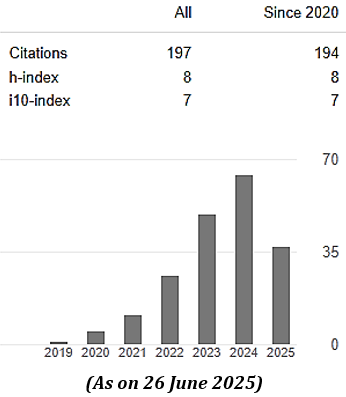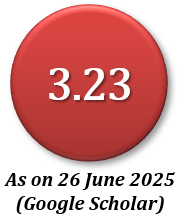Journal Ethics and Policies
Principles of Transparency and Best Practice followed by MIJST JOURNAL:
MIJST Journal has meticulously designed its website to uphold high ethical and professional standards. The website includes the following key elements:
- An 'Aims & Scope' statement that clearly outlines the journal's objectives and areas of focus.
- Publication criteria, which detail the standards and criteria followed by the journal for accepting and publishing articles.
- Display of the ISSN (International Standard Serial Number) under Bibliographic Information, providing a unique identifier for the journal.
- A clear indication of whether each article has undergone peer review or not, ensuring transparency about the review process.
- Comprehensive descriptions of the peer review process and policies are available on the journal's website for authors and readers to access.
- The Journal Editorial Board consists of recognized subject experts within the journal's scope, and their full names and affiliations are provided on the website.
- Full names and affiliations of the journal's editors are also clearly presented on the website. Contact information for the editorial office is readily available.
- Copyright policies are explicitly stated in a dedicated copyright policy section, with the name of the copyright holder included in all published articles. Licensing information is also provided on the website.
- The editors are diligent in identifying and preventing research misconduct, including plagiarism, citation manipulation, data falsification, and fabrication, among others. They adhere to COPE (Committee on Publication Ethics) guidelines when addressing allegations of research misconduct.
- The periodicity of journal publication is clearly indicated on the Editorial Note and Call for Papers pages, allowing readers to know the journal's publication schedule.
- The accessibility of the journal and individual articles to readers is described on the journal's website, specifying how and where the content is available.
- MIJST is a non-profit organization, emphasizing its commitment to academic and research integrity over financial gain.
These features demonstrate the journal's dedication to transparency, ethics, and professionalism in its publishing practices.
ETHICAL EXPECTATIONS
Executive Editor other Editorial Members
The editorial team at MIJST Journal adheres to a set of ethical principles and responsibilities:
- Editorial Impartiality: All editorial duties are carried out in a fair, impartial, and balanced manner, without any form of discrimination based on factors such as race, gender, ethnicity, religious beliefs, or geographical origin of the authors.
- Constructive Feedback: Editors provide constructive, fair, and informative critiques of authors' work, highlighting weaknesses in content and language while offering suggestions for improvement.
- Ethical Vigilance: Editors remain vigilant for potential ethical violations in the author's work, including issues such as plagiarism and duplicate submission.
- Investigation of Ethical Concerns: Editors are committed to investigating all complaints of ethical violations and conflicts of interest, approaching such matters in a fair and objective manner, without consideration of when the incident occurred.
- Confidentiality: Editors uphold the confidentiality of information, ideas, and the author's work, refraining from using it for personal advantages or gains.
- Journal Integrity: Editors take every possible measure to safeguard and maintain the integrity of the journal, ensuring the highest standards of ethical and academic publishing practices.
Peer Reviewers
Reviewers at MIJST Journal are expected to adhere to the following ethical guidelines:
- Constructive and Fair Review: Reviewers are required to provide a constructive, fair, and informative critique of the author's work, identifying weaknesses in analytical presentations, scientific content, and language. Reviewers should also offer corrective comments for improvement.
- Confidentiality: Reviewers must maintain the confidentiality of the peer review process. They should refrain from disclosing or discussing the contents of the manuscript with individuals who are not directly involved in the peer review of the manuscript.
- Ethical Vigilance: Reviewers are encouraged to remain vigilant for instances of ethical violations in the author's work, such as plagiarism and duplicate submissions. If any such instances are noticed, reviewers should promptly inform the editors.
These guidelines help ensure the integrity, quality, and fairness of the peer review process.
Authors Responsibilities
Authors submitting manuscripts to MIJST Journal are expected to adhere to the following ethical guidelines:
- Prior Publication: Authors should submit a manuscript for publication only if it has not been previously published, accepted for publication, or is under consideration for publication elsewhere.
- Data Records: Authors should maintain accurate records of data associated with the submitted manuscript and make this data available upon request by the Editorial Office.
- Proper Citation: Authors must acknowledge and properly cite sources when using content from their own or others' previously published articles or articles currently under review in any journals. This includes citing the original sources from which secondary sources are derived.
- Informed Consent: Authors should obtain written informed consent from human subjects involved in their research and respect their privacy. This is especially important if any identifying information such as photographs or names of subjects is included in the study.
- Declaration of Conflicts of Interest: Authors are required to declare any potential conflicts of interest for all authors of a submitted work at the time of manuscript submission.
- Authorship and Acknowledgment: Authors should assign authorship in accordance with international norms and acknowledge anyone who provided support for the study but does not meet the criteria for authorship.
- Avoidance of Ethical Violations: Authors must take all necessary precautions to prevent ethical violations and unethical behavior in their submitted manuscript, including avoiding duplicate submissions, plagiarism, citation manipulation, data falsification, improper author contributions, and redundant publications. MIJST Journals have a policy that limits citations in a manuscript to not more than 20%.
- Prompt Notification of Errors: Authors should promptly notify the journal editor or publisher if significant errors are identified in their work during the review process or after the publication of the article.
- Cooperation in Investigations: Authors are expected to cooperate with the editor in the investigation of ethical violations and immoral conduct.
- Legal Compliance: Authors should not violate the National Publishing Law of their country, offend any religious faith, humiliate any person, community, or nation, or undermine the spirit of Liberation War, whether directly or indirectly.
Journal Archiving policy
MIJST follows the following Archiving policies:
- MIJST uses its own institutional server for long term preservation of all the journal relevant materials.
- MIJST also uses MIST Central Library Repository for maintaining a backup of the published articles and relevant materials.
- MIJST only archives the publication related materials as submitted by the authors, accepted and rejected articles, and relevant material.
- The materials archived in MIJST will be used exclusively for the stated purposes of this journal and will not be made available for any other purpose or commercial uses.
Open Access Policy
MIJST follows the following open access policies:
- MIJST has rights to distribute their scholarly articles for any non-commercial purpose.
- All research articles published in MIJST journal are fully open access: immediately freely available to read, download, copy, distribute, print, search, link to the full texts of articles, crawl them for indexing, pass them as data to software, or use them for any other lawful purpose.
- Articles are published under the terms of a Creative Commons Attribution-NonCommercial 4.0 International License which permits use, distribution and reproduction in any medium, provided the original work is properly cited.
Plagiarism Policy
MIJST follows the following plagiarism policies:
- All the submitted articles will go through plagiarism (turnitin) check.
- MIJST accepts 20% or below for the similarity report.
Adhering to these ethical guidelines is essential to ensure the integrity and quality of published research and uphold the ethical standards of the journal.
















